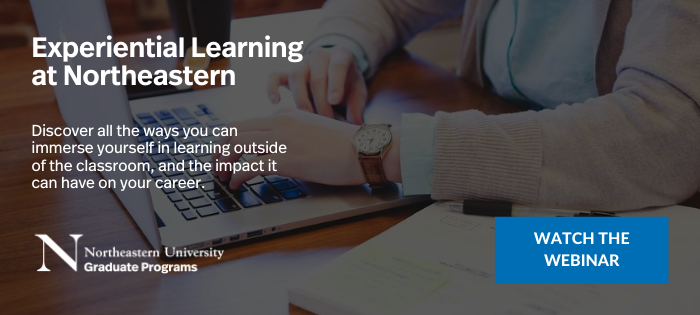
You won’t have to spend very long on Northeastern’s website or campus before you hear about experiential learning. This type of education forms the basis of the university’s learning model, so it’s important to understand what it really means.
Here’s your complete guide to experiential learning and how it can make all the difference in your education and career.
What is Experiential Learning?
Experiential learning integrates classroom studies, professors who have industry experience, and learning experiences based on real business problems. These experiences can range greatly. In some cases, students tackle in-class projects using actual company data to solve an issue for that company, such as analyzing ways to increase customer retention. Other experiential opportunities include three-to-six-month co-ops, in which students work full-time at a sponsoring organization.
“It’s an approach that’s fully embedded into the learning journey,” says Charles Kilfoyle, Assistant Vice President of Employer Engagement & Career Design at Northeastern. “You get the opportunity to apply the classroom skills and theory that you’re learning to a real business problem with a real sponsor and see the results firsthand.”
This immediate connection with major companies around the world underscores Northeastern’s approach to experiential learning across all colleges and levels of education. With more than 3,000 employer partners around the world, Northeastern students have endless opportunities to take their education beyond the classroom.
Experiential Learning at Northeastern
Discover all the ways you can immerse yourself in learning outside of the classroom.
Experiential Learning Options
At Northeastern, students can participate in experiential learning anywhere around the world. Here are a few of the many categories in which students put their classroom studies to work.
Co-Op
While on co-op, students work full-time at a sponsoring organization for between three and six months, usually instead of taking classes. As a fully-integrated team member, they work on projects, collaborate with co-workers, and learn what it’s like to work in their industry of choice. Co-ops are among the most popular experiential learning opportunities at Northeastern. Within the graduating class of 2017, 97 percent of students completed at least one co-op, while nearly half completed two.
Learn More | Co-op vs. Internship: What’s the Difference?
Internships
Northeastern also offers traditional internships, which students typically complete over the summers or while taking classes during the school year. These experiences can be an excellent way for students to test out new career options or industries.
Experiential Learning at Work
Many Northeastern graduate students must balance a career, school, family, and more. Completing experiential projects at work can help them get the most out of their education without additional stress. A project management student, for example, may implement a new management system at their office and examine the results in class, while a computer science student may use their new programming skills to create custom software for their business.
Service-Learning
Service-learning combines volunteer work with learning experiences. This can take a variety of forms, from service trips abroad to helping out at a local nonprofit. No matter the type of experience, it will relate back to the student’s career of choice. Service-learning can also connect to any industry. A business student may volunteer at a tax prep clinic, while someone interested in climate change may study and support resilience efforts in a coastal community.
Experiential Network
Not all experiential learning must happen outside the classroom. Through Northeastern’s Experiential Network (XN), students can work on in-class projects designed to solve problems for a business partner. They can analyze business data, develop strategies, and make recommendations for global partners within their industry. These short, flexible projects are embedded into dozens of Northeastern classes, ensuring that students are always connecting with the latest information from real companies.
Consulting
Working individually or in teams, students research and analyze information to provide a report directly to a sponsoring organization. These consulting projects position students as subject matter experts and give them the opportunity to implement their studies into a real-time problem of practice.
Practicums, Clinicals, and Fieldwork
Students get the opportunity to engage in practicums, clinicals, and fieldwork in certain career paths. These supervised experiences in hospitals, classrooms, and more allow students to work in their career of choice while receiving feedback and training from established professionals.
Capstone Projects
At the end of their academic careers, students have the opportunity to take on a capstone project that summarizes their learning. They can choose the scope and type of their project, from creating a documentary to launching a startup, and work with faculty to bring their ideas to life.
In addition to these experiential learning options, each course at Northeastern is designed with hands-on experience in mind. Faculty ground their courses in real-world, scenario-based assignments and classroom teaching and provide extensive space for feedback and reflection throughout the semester. This helps students connect their studies to situations they may encounter during their careers and promotes strong critical thinking skills.
The Value of Experiential Learning
With 98 percent of Northeastern’s 2017 class either employed or in graduate school within nine months of graduation, the power of experiential learning is evident. Here are some of the many benefits you’ll find.
Gain Confidence
Experiential learning opportunities aren’t manufactured––they happen in real organizations and in real-time, which puts your knowledge to the ultimate test. Instead of encountering this for the first time after graduation, you’ll get the chance to refine your skills and experience work in the field before graduation, building confidence as you do.
“Students engage with employers early and often,” Kilfoyle says. “They don’t need to wait until they graduate to find out whether or not they can apply their skills successfully.”
Improve Your Resumé
In a 2019 study by the National Association of Colleges and Employers, employers listed work experience through an internship or co-op as the primary way they differentiate between candidates. Many companies expect new hires to have the equivalent of 18 months of work experience, according to Kilfoyle—which can be particularly difficult to reach when balancing work, school, and family, as many students must.
Experiential learning is incorporated into your studies, making it easier to gain the work skills necessary to land a job after graduation. Between in-class projects, co-ops, and the opportunity to take on additional experiences as your schedule permits, you’ll develop a strong resumé and the skills to go along with it.
Grow Your Network
Networking can be critical in any industry. Having strong connections may help you get a letter of recommendation, a mentor, or even a job. This can be particularly important for adult learners who are trying to advance or change careers.
“Experiential learning allows you to scaffold opportunities while you’re completing a degree,” Kilfoyle says. “A learner might start out with an XN project early in their program that turns into a co-op with the same sponsor, and that co-op may lead to a job there.”
Begin Your Experience
Because experiential learning is such an integral part of the Northeastern experience, students receive extensive support every step of the way. A mandatory co-op preparation course helps them explore careers, write resumés, learn workplace etiquette, and practice for interviews. They also have access to workshops, mock interviews, and counseling services in addition to personalized support from an assigned co-op counselor.
Watch our virtual webinar here to learn more about experiential education at Northeastern.






Related Articles
Why Earn a Professional Doctoral Degree?
5 Tips to Get the Most out of Grad School
Is Earning a Graduate Certificate Worth It?